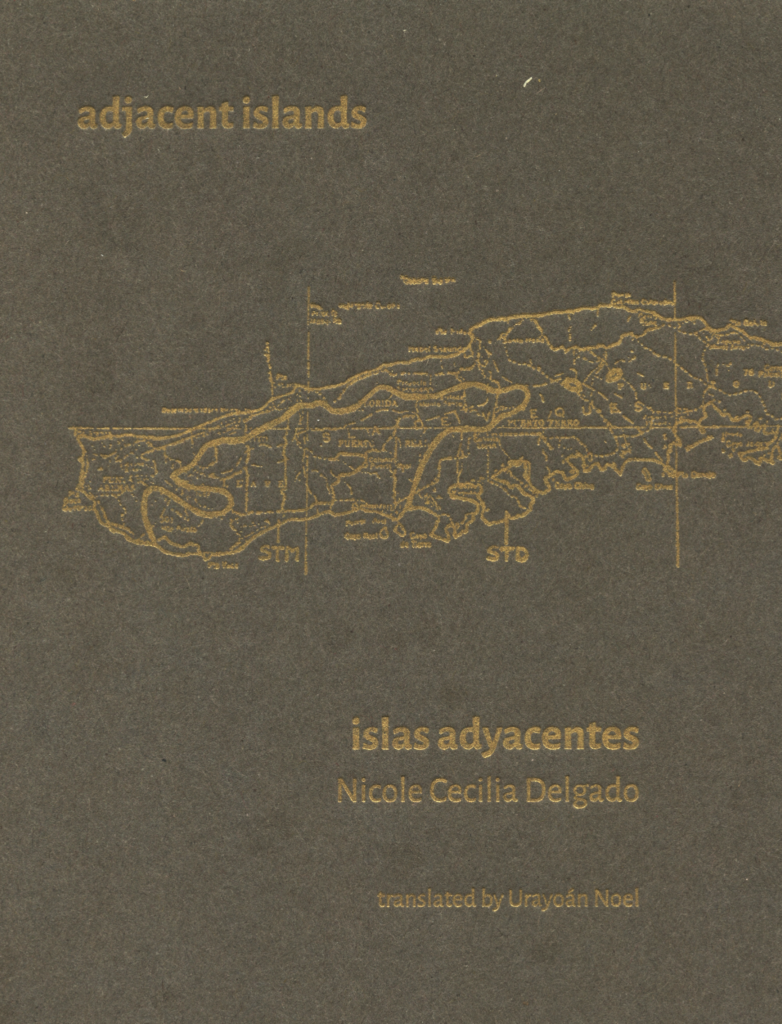Halfway between a life diary and a traveler’s notebook, Nicole Cecilia Delgado’s adjacent islands firmly establishes itself within the tradition of works that cannot be easily categorized. Using travel and exploration as methodology, the poet builds a personal and communal testimony of a territory marked by occupation, usurpation, and abandonment. The book is an intimate map that, like the constellations that decorate the sublime space between the islands, shines and reflects what the author rightly calls the piercing words of our struggle. That ceaseless struggle, which is the struggle against oblivion, resounds with courage and beauty in these poems that emerge pristine from the song of the deep sea, revealing all its secrets. Ecopoetry meets documentary poetry plus fieldwork as meditation as contemplation as activism equals the art book as art object as document as resistance. Hand in hand with a delicate and attentive translation by Urayoán Noel, tenderness, discipline, and survival emerge in these pages as a new holy trinity, ready to unfurl the twisted song of memory. adjacent islands is a graceful, courageous, and necessary reclamation, not only of a territory, but of our own history, of our very origins, those that no colonization will ever be able to take away from us.
Carlos Soto Roman
Nicole Cecilia Delgado's amoná and subtropical dry together weave a poetics of feet on the ground, of territory; they register that experimental time of the camping trip, where we so purposefully surrender ourselves to the sea, the cave, the path, in a type of temporary sensory community that carries all its questions on its back. These adjacent islands open a space for thinking from an embodied practice whose material is time. In this collection, that presumed "first man" could be our traveling companion, a first consciousness understanding itself as part of a cosmic mechanism; today between ceiba tree and anamú herb, tomorrow between asphalt and star. The words that name animals, fruits, coastal life forms, collectives of community struggle and walking bodies — all of them come together rallying in motion, under the sky, unprotected. This is a poetics that is susceptible to microclimates and to the words of the other, anchored in the accumulation of historical accidents, all of it interlocking in that special camping time that fine-tunes the senses. This book is a machine of cosmic times.
Beatriz Santiago Muñoz
In this bilingual edition, Nicole Delgado’s vivid poetry and Urayoán Noel’s deft translations transport us to Mona and Vieques in the Puerto Rican archipelago. Throughout, we witness the poet and her companions camp in these tropical spaces. While they sleep outside, swim naked, pick fruit, and watch the rising sun, they also confront the environmental wounds wrought by colonial militarism. Delgado’s words render their spiritual communion with islands as her community formed new kinships, saw the open sky and its constellations, and listened to the profound songs at the bottom of the sea.
Craig Santos Perez
Nicole's poetry feels like that calm right after lightning strikes. Your body electrifies and the world seems still, quieter. But the natural world is never still, and our bodies are just as animal as the noise in the trees. Desire. We’re not separate. Nicole’s poetry knows this. How can it not? She writes from Puerto Rico, which suffers, acutely, the effects of colonization and the climate crisis. Hers is a poetry written — and lived — amidst Hurricane María, the Wall Street debt crisis, the PROMESA bill, and now a chain of earthquakes [...] along its southern perimeter.
Katie Marya
